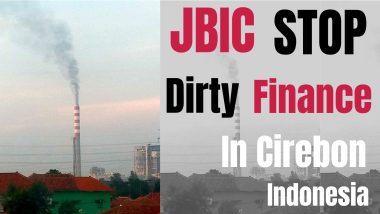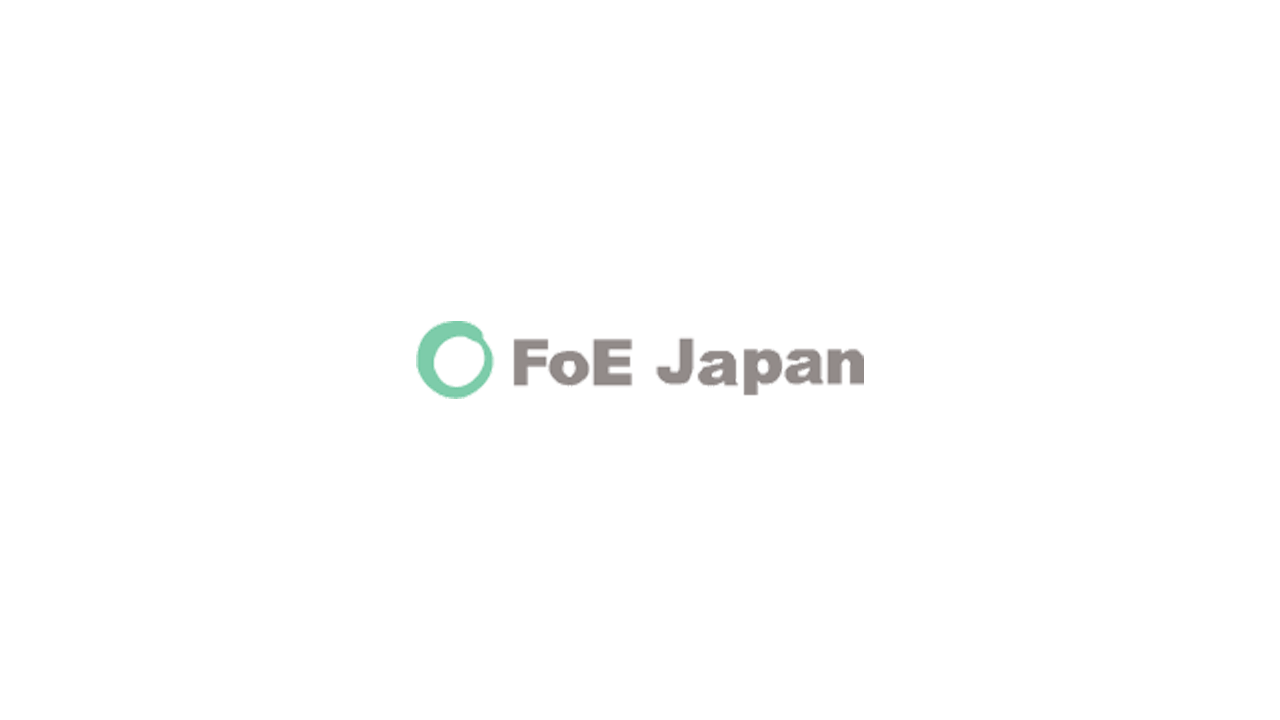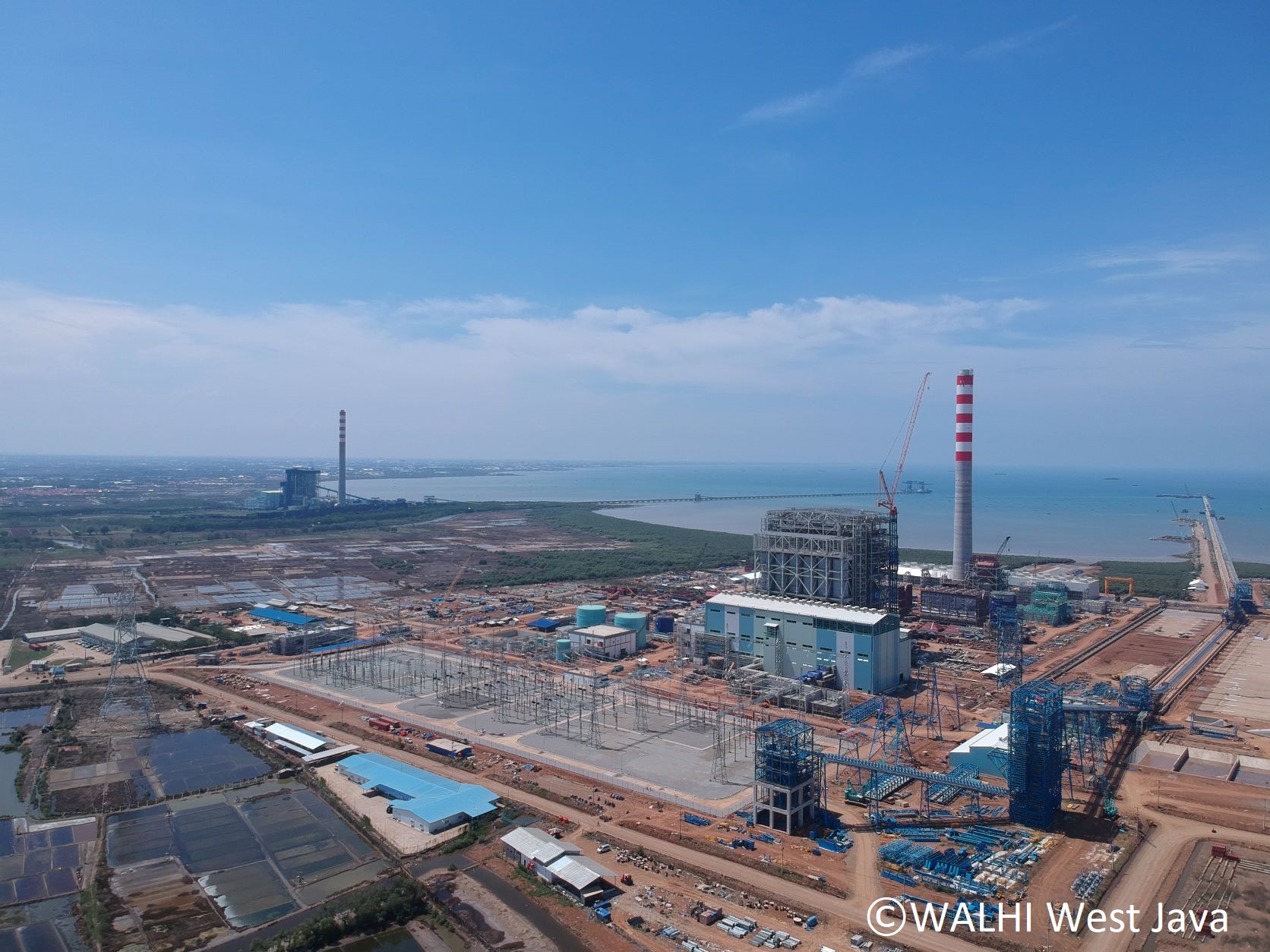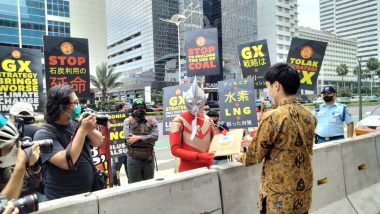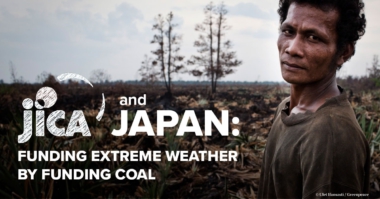Indonesian residents and NGOs visit Japan to request: Japanese government and banks must stop financing Cirebon coal-fired power plant Unit 2 and take responsible action for early retirement of Unit 1!
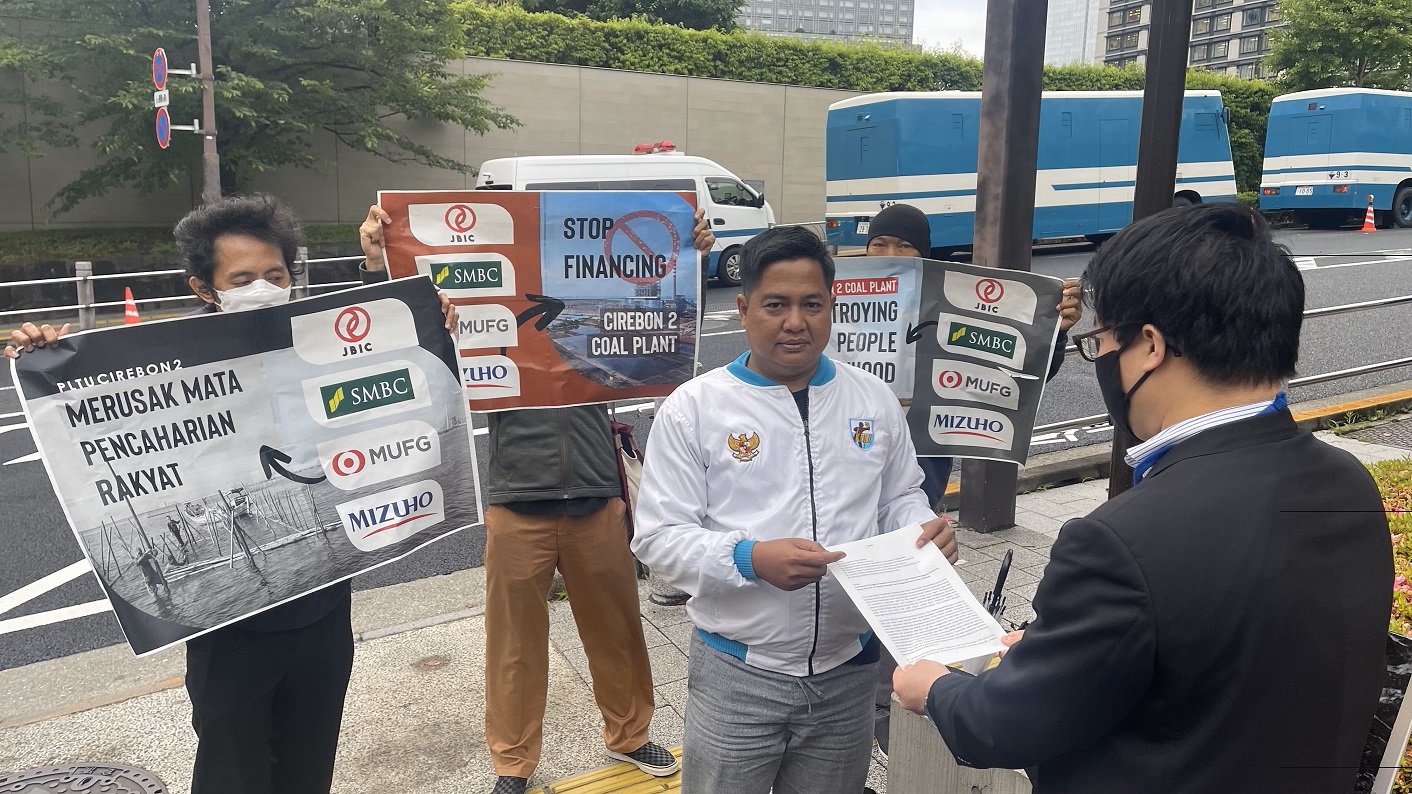
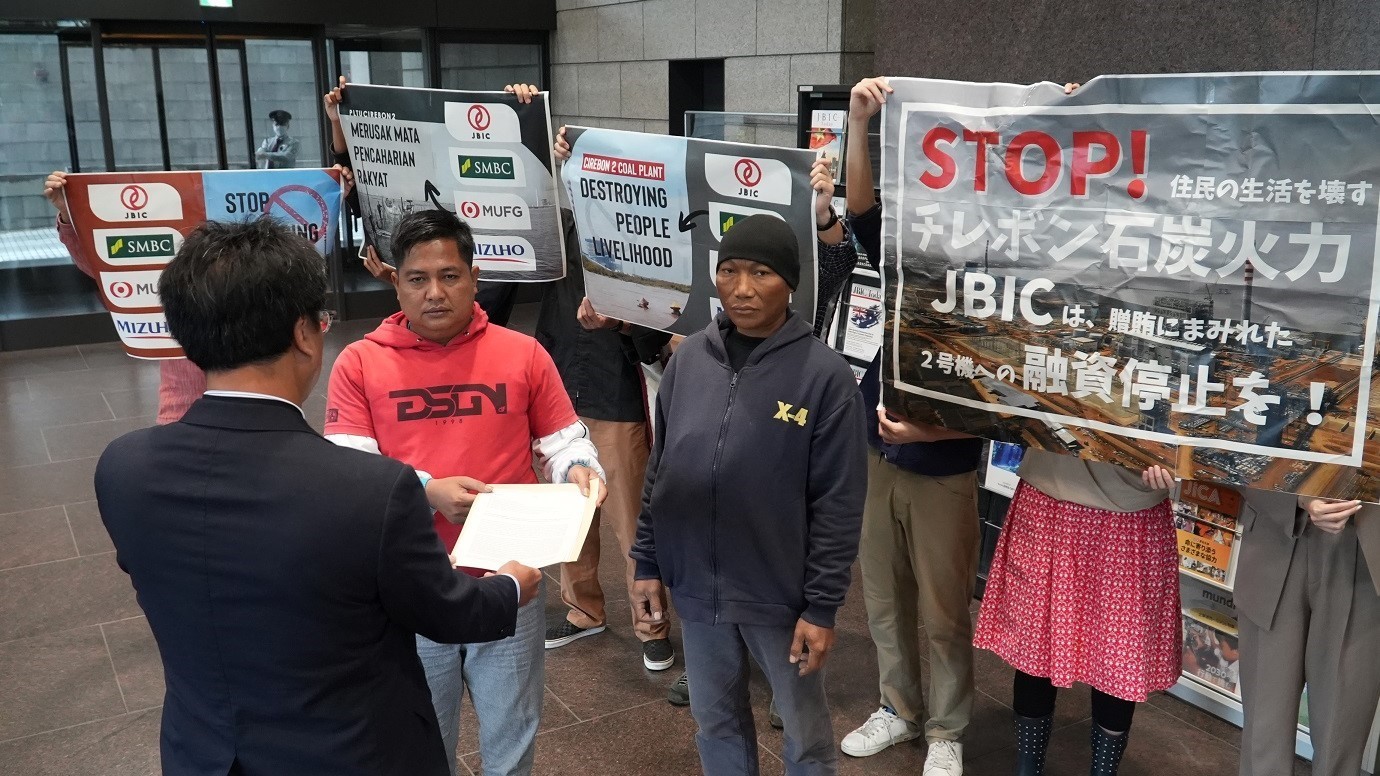
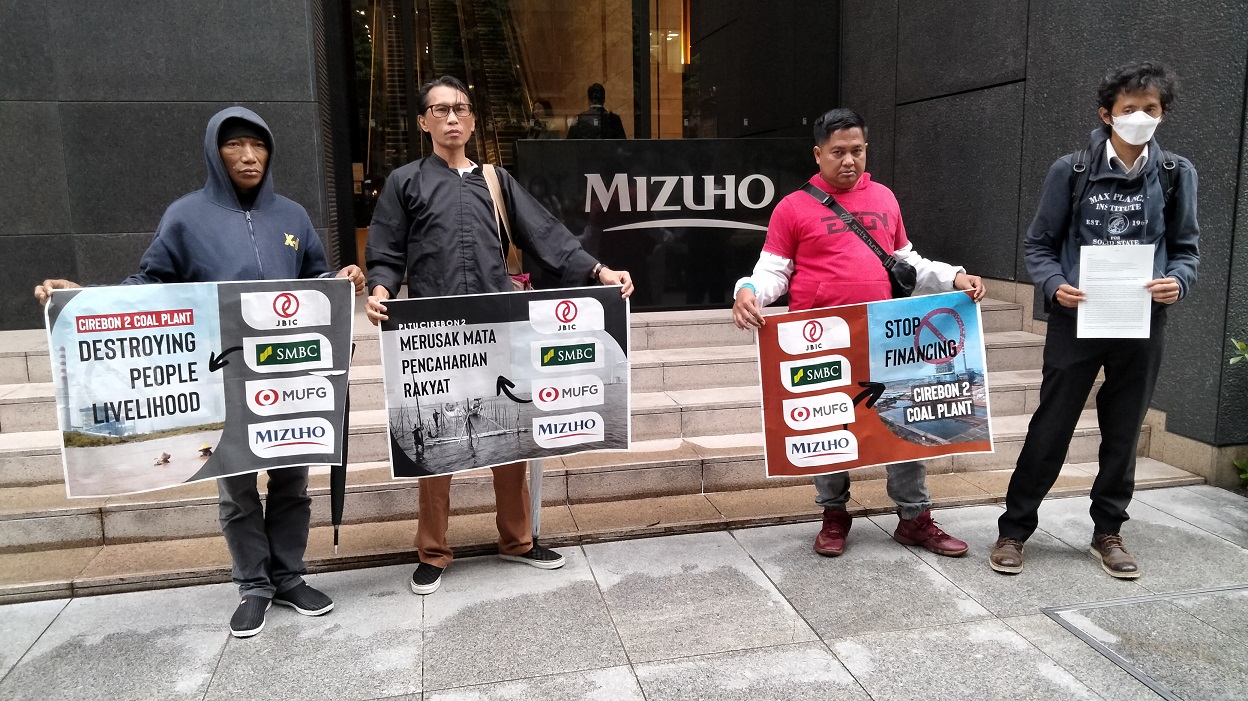
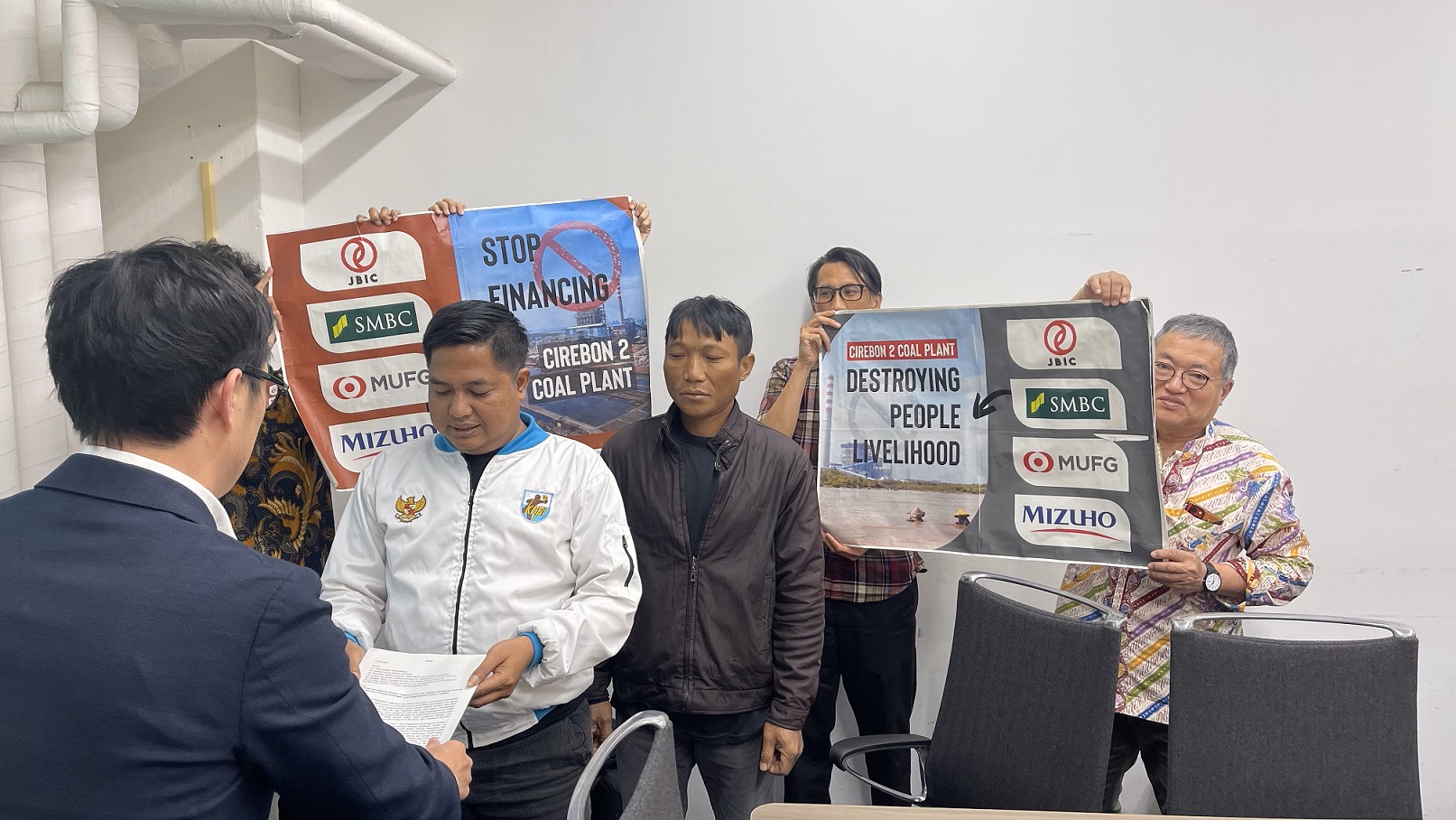
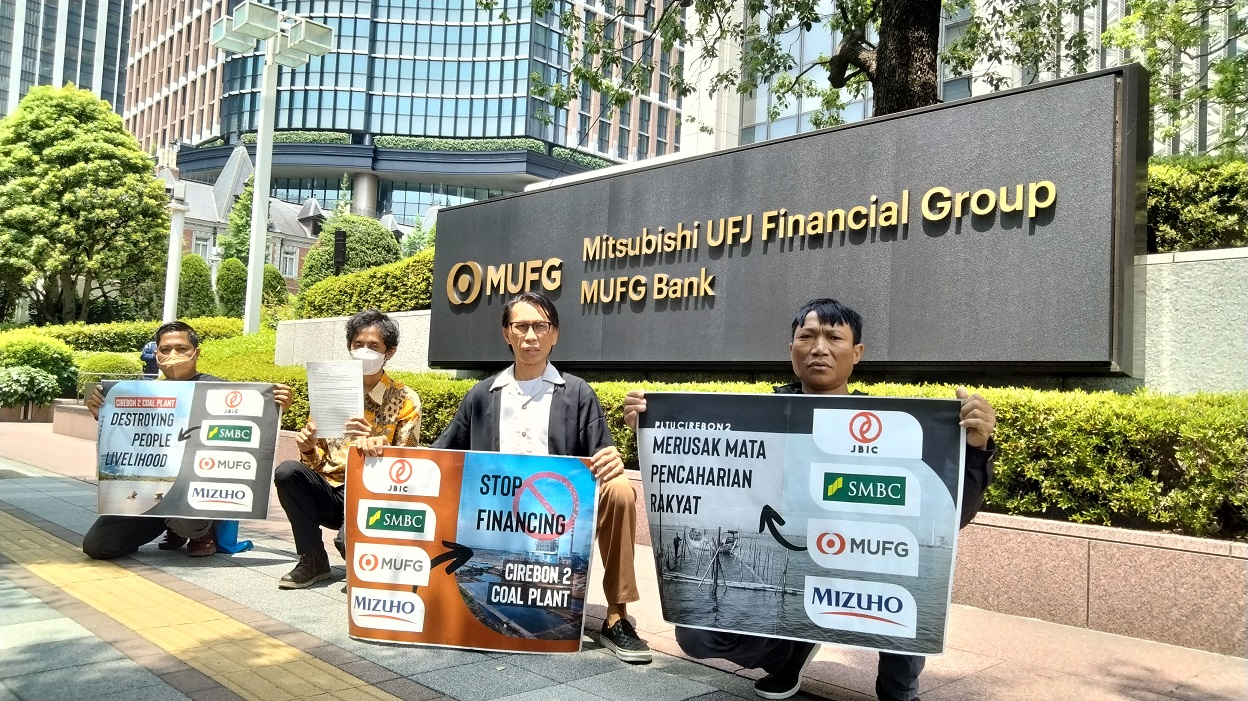
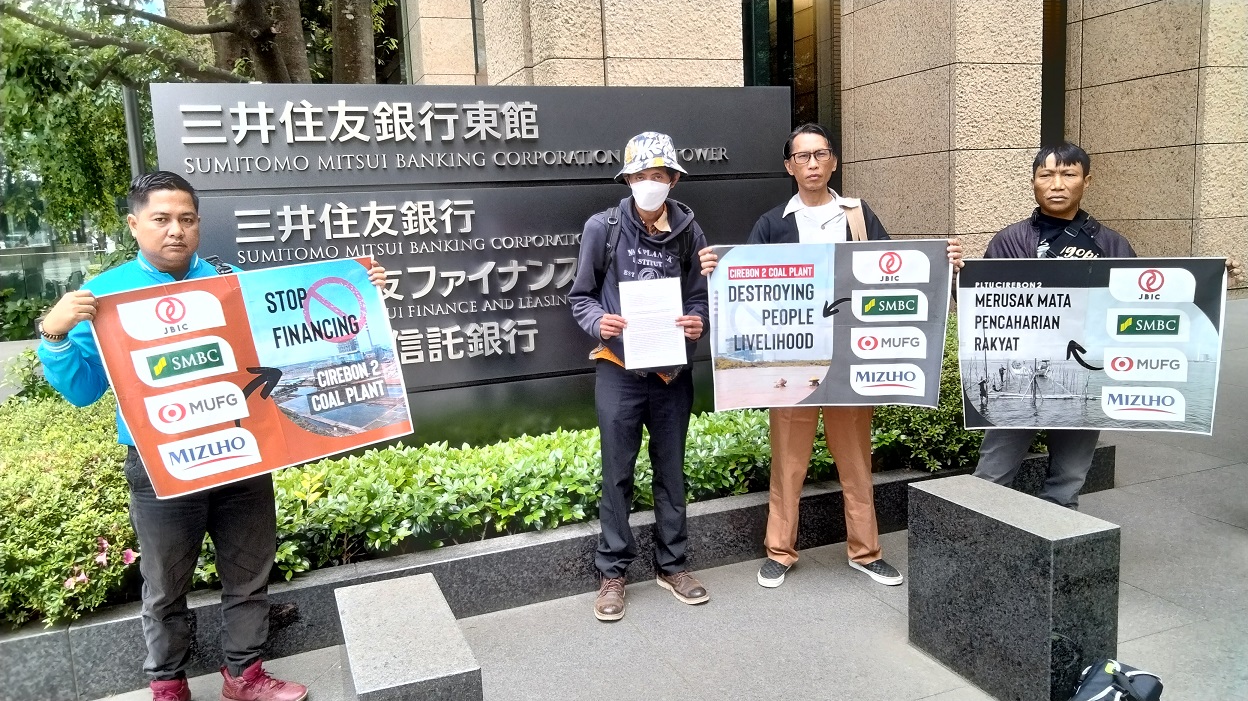
On May 22-24, 2023, two residents affected by the Cirebon coal-fired power plant project (the Project) in Indonesia and two members of local NGOs (WALHI and WALHI West Java), which has been supporting the community’s opposition, visited Japan and handed a petition (endorsed by 61 organizations from around the world) to the Japanese government and the banks, urging them to stop financing Cirebon Unit 2 (1,000 MW) and to take responsible action for early retirement of Cirebon Unit 1 (660 MW). The Project is invested by Marubeni and JERA (a joint venture between Tokyo Electric Power Company and Chubu Electric Power Company) and financed by the Japan Bank for International Cooperation (JBIC, 100% owned by the Japanese government) and three mega banks (Mitsubishi UFJ Bank [*], Mizuho Bank, and Sumitomo Mitsui Banking Corporation).
* The petition was sent by postal mail since Mitsubishi UFJ Bank declined to meet with the group due to its busy schedule)
Cirebon 2, which is under trial, is reported to start commercial operation soon, but concerns about the worsening impact on residents’ livelihoods and health continue to be raised. In addition, the trial against the Cirebon former regent in a bribery case related to the issuance of the license for Cirebon 2 has been continuing. Cirebon 1, which has been in operation since 2012, is currently slated for “early retirement" under the Energy Transition Mechanism (ETM) led by the Asian Development Bank (ADB), in which Japan is the largest donor. However, negotiations are underway without the participation of residents and civil society, and the possibility of “repurposing" the plant through co-firing technologies such as ammonia has also been a concern.
In order to ensure that the residents, who have suffered serious impacts on their livelihoods and health for the past 16 years, do not suffer further damage, Japanese government and banks are urged to take responsible actions for the early retirement of Cirebon 1 and the cancellation of Cirebon 2.
Below is the English translation of the full text of the petition. (Click here for the PDF file. The original in Bahasa Indonesia is here. Japanese translation is here.
(Originally written in Bahasa Indonesia. The following is a English translation by WALHI West Java)
May 22, 2023
Mr. Fumio Kishida, Prime Minister
Mr. Shunichi Suzuki, Minister of Finance
Mr. Nobumitsu Hayashi, Governor, Japan Bank for International Cooperation
Mr. Hironori Kamezawa, President & Group CEO, Mitsubishi UFJ Financial Group, Inc.
Mr. Masahiro Kihara, President & Group CEO, Mizuho Financial Group, Inc.
Mr. Jun Ohta, Director President and Group CEO, Sumitomo Mitsui Financial Group, Inc.
Mr. Masatsugu Asakawa, President, Asian Development Bank
Request for Suspension of Loan Disbursement to Unit 2
and Responsible Action for the Early Retirement of Unit 1
in Cirebon Coal-Fired Power Plant Project, Indonesia
We, Rapel (Rakyat Penyelamat Lingkungan) and WALHI West Java, take this opportunity of our visit to Japan to reiterate our request to Japanese parties concerning the Cirebon Coal-Fired Power Plant Project (Cirebon Project). First, the Japan Bank for International Cooperation (JBIC) and the three Japanese mega-banks must immediately suspend the disbursement of loan for the Cirebon Coal Fired Power Plant – Unit 2 (Cirebon 2; 1,000 MW). The Asian Development Bank (ADB), which is leading the Energy Transition Mechanism (ETM), and other banks that may provide funds for the ETM in the future, whether public or private, must take responsible actions for the swift early retirement of the Cirebon Coal-Fired Power Plant – Unit 1 (Cirebon 1, 660 MW).
We have consistently demanded the closure of Cirebon 1 and the stop of the construction of Cirebon 2. One of the main reasons for our demands is the impact on the life, culture, and health of the local community. For example, before the Cirebon Project began, the community, children and adults alike, were able to go to the coast and harvest shellfish to supply their families with a meal. They were also able to send their children to school and build houses with the income from small-scale fisheries that do not use boats and salt pans along the coast. However, We have been telling the Japanese parties concerned how much the community has suffered since 2007, when Cirebon 1 began construction, due to the massive negative impact on their coastal livelihoods, and how much the construction of Cirebon 2, which has been underway since 2016, has already hampered the community’s life and made it more difficult for the residents. In particular, we have explained the concrete damages to JBIC in our Objection to Cirebon 1 (November 2016) [1] and our Objection to Cirebon 2 (May 2017) [2].
JBIC seemed to believe that Corporate Social Responsibility (CSR) programs could be effective in response to our complaints. Whenever we had meetings with JBIC, CSR programs were consistently suggested. We have always explained to them that CSR programs are not the real solution for the local communities. What the local communities need is clean air and clean water for their living. More specifically, they need a sound coastal environment for fishing activities, and they need sound land, water, and air for salt making.
And now, we would like Japanese parties concerning to look directly at how local communities have been facing difficulties in their daily lives due to corruption-ridden and dirty projects with huge profits for big companies and local politicians. You have already heard that the former Cirebon regent has been indicted by the Indonesian Corruption Eradication Commission (KPK) for accepting bribes from Hyundai (Hyundai Engineering and Construction Co., Ltd.), the EPC contractor, to expedite the issuance of permits for Cirebon 2 and to calm the protests. In the KPK indictment (March 14, 2023) and several witness testimonies at the trials (since March 27, 2023), it was mentioned that former high-ranking officials of Cirebon Energi Prasarana (CEPR), a direct borrower from JBIC and the three mega banks, also provided some significant amount of money to the former Cirebon regent.
Are CEPR and Hyundai able to explain to JBIC and the three mega banks that the indictment and witness testimonies are not true with solid evidence? If they have not, then JBIC and the three mega banks should take this seriously and not continue to disburse loans to Cirebon 2, even if the former Cirebon regent has not yet been sentenced. If the banks are going to continue financing such a project, where there has been some strong evidence of bribery, then each bank must be accountable for its decision. This should also be a reputational issue for each bank.
To begin with, there is no need to operate Cirebon 2 in the Java-Bali power grid [3] [4], which is expected to have a 40-60% reserve ratio of power supply (2021-2030). Further, as embodied by the signing of a Memorandum of Understanding (MOU) between ADB, Cirebon Electric Power (CEP), and the Indonesian government for the early retirement of Cirebon 1 [5], it is a major contradiction to keep Cirebon 2 in operation for the next 25 years when the climate crisis is so urgently needed to be tackled. Or will a framework like the ETM again be used to compensate for the losses that major private companies will have to take in the future as Cirebon 2 becomes a stranded asset? We firmly believe that the justification for the start or continuation of commercial operation of Cirebon 2 is now even less valid than before.
The fact that negotiations have begun on the early retirement of Cirebon 1 appears to be a welcome move for all of us who have been calling for its closure for many years. However, we would not welcome it with open arms if the contract term, originally set for 2012 to 2042 under the Power Purchase Agreement (PPA) between CEP and Indonesian state-owned power company (PLN), were to be shortened by 5 or 10 years. Nor would we welcome the “repurpose" of Cirebon 1 through biomass/ammonia/hydrogen co-firing. Our expectation is that Cirebon 1 will be closed and the environment restored as soon as possible, so that the impact on the local community will not continue.
We are also very disturbed that although the early retirement of Cirebon 1 is a matter of grave concern to us, the negotiations and decisions are now being made without our knowledge or consent. This is no different than how Cirebon 1 and Cirebon 2 have gone forward without proper public consultation.
ADB stated that one of the reasons why Cirebon 1 was selected as the first project to use the ETM was that CEP had already been actively implementing CSR programs. [6] However, as described above, it should be understood that CSR does not restore or improve the previous life and culture of the local community if one comes to the site and sincerely observes the impacts and listens to the testimonies of the local residents.
We have made persistent efforts to convey the plight of the local communities during the site visits and meetings of JBIC and JBIC’s Examiners for Environmental Guidelines. However, all of these field visits and face-to-face meetings have been unsuccessful and we have been very disappointed and even resentful because the testimonies of the affected communities have been greatly disregarded. For example, when it comes to the decrease in the catch of small-scale fisheries who do not sell their catch at the auction site but bring it home directly from the coast for home consumption or sale to their neighbors, the conclusion that “the catch is almost unchanged," that is, unaffected, based on statistics that are available from the relevant local government agencies, is a clear evidence that no sympathetic investigation or hearing has been conducted for the affected residents. [7]
We understand that the ADB’s environmental and social audit team is currently conducting investigations on Cirebon 1, including site visits, but the investigations must be conducted in a manner that values the testimonies and perspectives of the residents affected by the project. It should not be forgotten that they are addressing the environmental, social, health, and cultural issues of the same human beings, whether in Japan or in Indonesia.
Each government, including the Japanese government, and international financial institutions, including the ADB, are actively trying to establish a support framework to accelerate a “just" energy transition. This “just" must cover not only the employment perspective, but also the “just” for the residents affected by the construction and operation of the power plant so far. In order to achieve the swift early retirement of Cirebon 1, ADB and the financial institutions that will be involved in ETM should take responsible actions to ensure a " just" energy transition that includes restoration of the living environment and livelihoods of the local communities affected by the project, while ensuring transparency and opportunities for participation by the local residents.
We strongly urge Japanese parties concerned to make wise decisions and take actions, including responsible actions for the early retirement of Cirebon 1 and the cancellation of Cirebon 2, so that the local communities, who have already suffered serious impacts on their livelihoods, health, etc., due to the construction and operation of Cirebon 1 and construction of Cirebon 2, will not suffer any further damage.
Cc:
Mr. Yasutoshi Nishimura, Minister of Economy, Trade and Industry
Mr. Atsuo Kuroda, Chairman and CEO, Nippon Export and Investment Insurance (NEXI)
Ms. Mami Oku and Mr. Hiroshi Sase, Examiners for Environmental Guidelines, Japan Bank for International Cooperation
Initial Signatories:
Rapel (Rakyat Penyelamat Lingkungan)
WALHI West Java
Wahana Lingkungan Hidup Indonesia
Endorsements (61 organizations):
(Please see the original letter in Bahasa Indonesia for the list of 61 organizations.)
Contact:
WALHI West Java
Address: Jl. Pecah Kopi No.14, Sukaluyu, Kec. Cibeunying Kaler, Kota Bandung, Jawa Barat 40123, Indonesia
TEL: +62 22 20458503
Email: walhijabar@gmail.com
[1] https://www.foejapan.org/en/aid/161110.html
[2] https://www.foejapan.org/en/aid/170524.html
[3] https://ieefa.org/resources/indonesia-wants-go-greener-pln-stuck-excess-capacity-coal-fired-power-plants
[4] https://www.cnbcindonesia.com/news/20230208134534-4-412119/bukan-jawa-ternyata-ini-daerah-yang-listriknya-paling-luber
[5] https://www.adb.org/news/adb-indonesia-partners-sign-landmark-mou-early-retirement-plan-first-coal-power-plant-etm
[6] https://www.adb.org/what-we-do/energy-transition-mechanism-etm
[7] https://foejapan.org/wpcms/wp-content/uploads/20221108_Cirebon-2_Response-to-Examiners_EN.pdf
